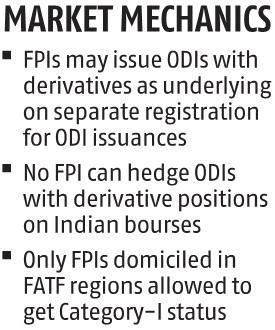
The eligibility norms for NRIs/OCIs, however, have been retained according to the erstwhile circular.
The Securities and Exchange Board of India (Sebi) on Tuesday issued operating guidelines for overseas investors, largely in line with the recommendations in the HR Khan Committee report.
The regulator has eased conditions for hedging offshore derivative instruments (ODIs), allowing foreign portfolio investors (FPIs) to issue these instruments with derivatives as underlying if they take up separate registration specifically for ODI issuances.
The eligibility norms for NRIs/OCIs, however, have been retained according to the erstwhile circular. Earlier, ODI issuers were co-mingling their proprietary and hedging positions, and it was difficult to establish one-to-one linkage, said experts.
The norms say FPIs won’t be allowed to issue ODIs referencing derivatives, and that no FPI shall be allowed to hedge its ODIs with derivative positions on Indian bourses.
However, derivative positions taken on exchanges for ‘hedging of equity shares’ held by FPIs in India, on a one-to-one basis, will be permitted through a separate registration by an ODI-issuing FPI, under Category-I. Sebi has clarified that “hedging of equity shares” means taking a one-to-one position in only those derivatives that have the same underlying as the equity share held by the FPI in India.

“An ODI-issuing FPI may hedge the ODIs, referencing equity shares with derivative positions in Indian stock exchanges, subject to a position limit of 5 per cent of market-wide position limits for single-stock derivatives. The permissible position limit for stock index derivatives is higher of Rs 100 crore or 5 per cent open interest,” said the guidelines.
“The guidelines are a step in the right direction for realising the dream of ‘ease of access’ for FPIs, by simplifying registration and KYC requirements,” said Suresh Swamy, partner at PwC India.
Sebi has reiterated that only FPIs domiciled in regions under the Financial Action Task Force (FATF) can get Category-I status and issue ODIs. Officials from Mauritius’ Financial Services Commission had recently asked Sebi to reconsider its stance of allowing only FATF members to be eligible for category-I status.
FSC officials had also asked Sebi to tweak the guidelines to allow funds from FATF-compliant regions to register as category-I FPIs.
Regulated entities such as banks and asset managers may undertake investments on behalf of clients — only as Category-II FPIs, and only if those clients are individuals or family offices.
Central banks that are not members of the Bank for International Settlements will be allowed to register as category-II FPIs, provided the applicant is regulated by the banking sector regulator in its home jurisdiction. This would enable central banks from Mauritius, Cyprus, and West Asia to invest as FPIs.
First Published: Wed, November 06 2019. 01:11 IST
read the full story about Offshore derivatives: Sebi eases guidelines for hedging instruments
#theheadlines #breakingnews #headlinenews #newstoday #latestnews #aajtak #ndtv #timesofindia #indiannews
